Dairy Farming is a major sub-division of the agriculture sector. It means rearing dairy animals to produce milk and various milk products. The key dairy animals used to produce dairy products include cows, camels, buffalo, goats, horses, sheep, etc. Dairy farming also includes producing various milk products such as yogurt, cheese, cream, powdered milk, condensed milk, butter, Laban, Kurut, etc.
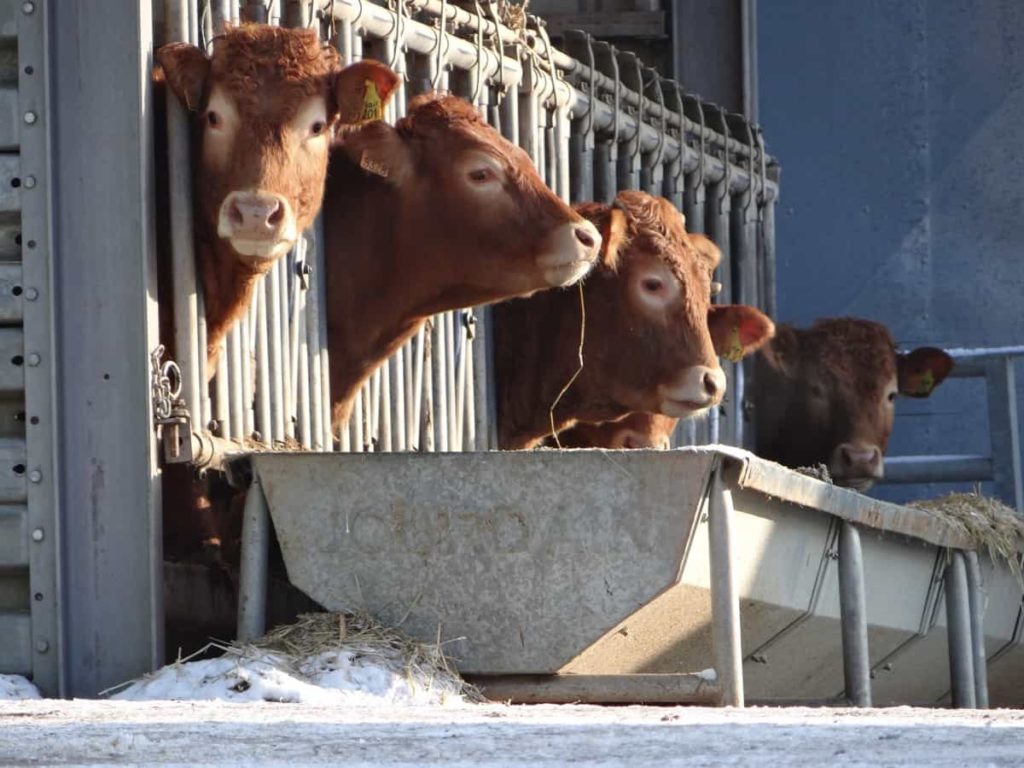
Why do the Farmers practice Dairy Farming?
Dairy Farming is a very profitable business all across the globe because:
- Dairy products are demanded and consumed by people of all age groups because it has high nutritional value, so the demand never falls.
- Marketing and selling milk and milk products is not a very difficult process. Dairy products generally have high demand in rural and urban areas and do not require huge advertising expenditure.
- Dairy farming can be started on either a small-scale or large-scale depending upon the resources and technology available to the dairy farmer. Therefore, even small and marginal farmers can carry out dairy farming and benefit from it.
- Dairy farming provides a good source of income for the unemployed rural population.
How to start Dairy farming in UAE from scratch
Dairy Industry in the United Arab Emirates
The dairy industry in the United Arab Emirates is increasing quickly. In 2020, the demand for milk and milk products was approximately US$1.66 billion, and it has been estimated that by 2026 the demand for dairy products will reach about US$ 2.47 billion, showing a growth rate of around 32.79%. The critical reasons for the increase in demand for dairy products are the increasing population, rapid economic growth, an increase in the per-capita income of the people, a massive influx of tourists, and an increase in health consciousness among people, especially after COVID-19.
Impact of COVID-19
Changing consumption patterns are considered to be one of the key reasons for the increase in demand for dairy products. Various studies and surveys were conducted to conclude that post-COVID-19 the residents in the United Arab Emirates have started focusing on nutrition-rich food. To further break down the demand figures, it has been observed that flavored and organic milk consumption is showing a steep rise.
In case you missed it: How to Start Dairy Farming From Scratch: A Complete Guide for Beginners
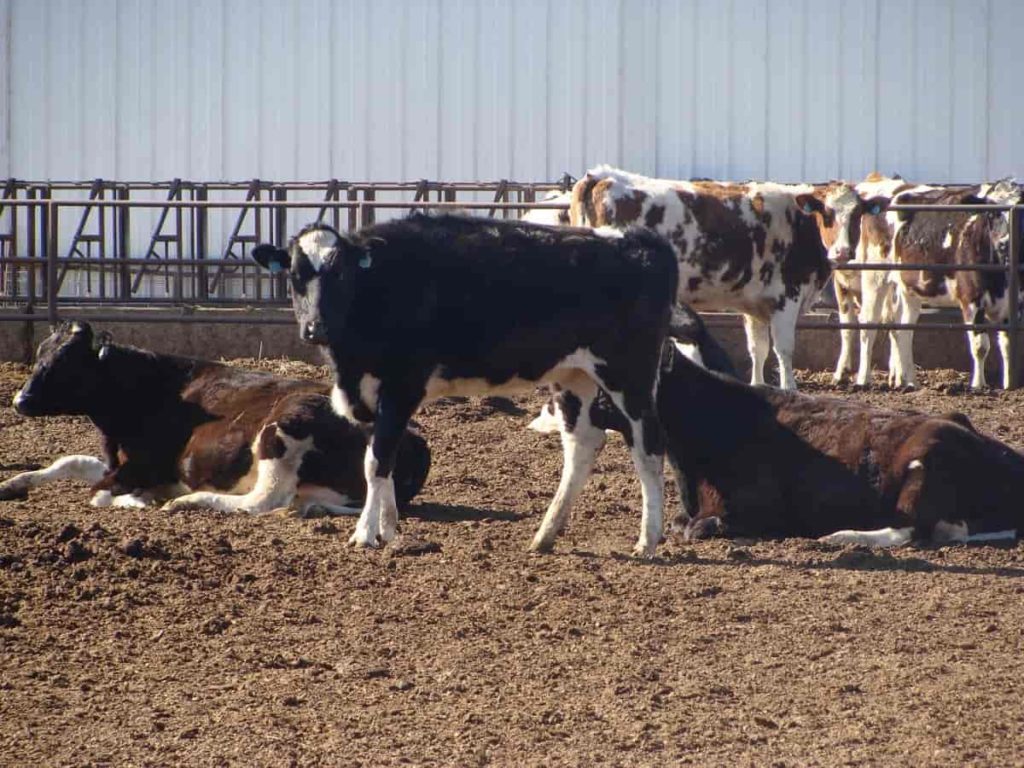
Dairy farming in the UAE is carried out by large-scale dairy companies.
In the United Arab Emirates, the dairy industry is dominated by large-scale industries. Carrying out dairy farming on a small scale is very difficult because of numerous challenges such as extreme heat, availability of food for animals, storage of milk and milk products, etc. A huge amount of investment is required to meet the challenges; hence it is tough for any small-scale farmer to be successful in dairy farming. Details about various challenges and the steps which are taken to mitigate the challenges are discussed later in the article.
Animal Breeds that are used for Dairy Farming in the UAE
The cows (Holstein-Friesians breed) for dairy farming in the UAE are majorly imported from
Germany and Holland. The Holstein-Friesians breed of Holland is typically used because of two
reasons:
- The Holstein-Friesians cows produce the largest quantity of milk, hence the firms use this
breed to increase milk volume. - The Holstein-Friesians cows are very friendly and they can be easily taught to accept
directions. On the other hand, American cows are more prone to diseases (mastitis) and the
Australian cows are not friendly. - In the case of Camels, they are hardly imported because they are desert animals. Though the camels take around 6 years to reach the milking stage which is very high compared to cows, import is not required since camels are easily available and adaptable to the climate.
Feed Management in Dairy Farming in UAE
The forage for dairy animals in UAE is not easily available because of the absence of natural grazing fields. The animal feed is imported from countries such as Argentina, Brazil, and the USA. The alfalfa plant which is an important part of the fodder (since it is rich in nutritions like potassium, calcium, vitamins (A, C, E, K), iron, etc.) is majorly imported from South Africa and Sudan.
Additionally, wheat, barley, maize, and soya bean are also used especially in the summer months to maintain the volume of milk produced (since animals’ appetite falls in the summer months, which impacts the quantity of milk). Dairy farms also use Digistar feeding wagons, which are used to manage the fodder stock so that adequate food is available throughout the year.
Disease Management in Dairy Farming
Like in any other country, animal diseases and infections in dairy animals are common in the UAE. The most common diseases are camelpox, foot and mouth disease, lumpy skin disease, mad cow disease, Bovine Ephemeral disease, Fever, etc. The United Arab Emirates takes very good measures for disease management because it directly impacts the volume of milk produced, and the death of animals, additionally, there is a risk of spreading of disease among other animals.
Veterinary doctors are employed permanently by dairy plants and the firms ensure their availability 24*7 so that immediate steps can be taken. Every dairy animal, especially cows have a chip and an electronic device attached to them. This device quickly identifies the disease in animals, helps in heat detection identifies the location of the cows, and also informs about the right time to make the animal pregnant.
Additionally, the veterinary doctors have to inform the veterinary authority in case of an outbreak of disease or infection. The veteran authority then informs the Federal Headquarters of Diseases Notification (MOEW), so that relevant actions can be taken on time.
Housing for Dairy Animals in UAE
In the country, the temperatures in the summer months cross 50 degrees and the humidity levels reach 98%. The cows are not used to such high temperatures since they are imported from colder countries (Holland and Germany). Special care for all the dairy animals is taken by the dairy plants to keep the animals healthy. The barns are covered by thick curtains to stop the ultraviolet rays of the sun, and ceiling fans and coolers are installed to keep the cows cool. Water misters and industrial water chillers are used to maintain the barn climate.
Steps that are required to open a dairy farm in the United Arab Emirates
Understanding the existing market.
Key dairy products that are in demand
Before setting up a dairy plant in the United Arab Emirates, it is imperative to remember that dairy product consumption patterns differ across all 7 emirates. Dubai, Abu Dhabi, and Sharjah are key cosmopolitan cities. The demand for dairy products in these emirates is slightly different from the other emirates because the maximum population in the three emirates is of ex-pats and people from other countries.
In the places where there are more people from an outside country, the demand for commodities like flavored milk, flavored yogurt, cream, butter, cow ghee, different varieties of cheese, laban, etc is high. In the UAE, some country/region-specific milk products are in huge demand, such as:
- Laban: Laban is a dairy product made from fermented milk. It is made by churning the fermented milk (milk is fermented for around 24 hours) and removing the butter from it. In a simple context, it can be considered one of the forms of buttermilk. Laban is a probiotic drink that has a very cooling effect on the body. Due to high temperatures, it is consumed on a large scale in the country.
- Labneh: Labneh is like a soft cheese made from strained yogurt and used in Mediterranean dishes.
- Kurut: It is a traditional fermented dairy product that is made by drying the yogurt and adding salt to it. The dry yogurt is given a round shape.
- Liquid Milk: Like in any other country, the demand for liquid milk is also high in UAE. Camel milk, full-fat milk, skimmed milk, and semi-skimmed milk are in high demand. Additionally, the demand for flavored milk is also gaining popularity, especially among the younger generations.
- Yoghurt: Yoghurt of different kinds can be easily found in the market. Different flavored yogurt, lactose-free yogurt, high protein yogurt, etc are available in the market, especially in areas with a significant population of ex-pats of western countries.
- The other products like ghee, butter, whey, cream, milk powder, ice cream, etc. also have a huge demand
The demand pattern for different dairy products differs not only between emirates but also within cities. Thus, proper research about the market is very important.
In case you missed it: 19 Key Rules for Effective Dairy Farm Management: From Planning to Reduce Production Cost
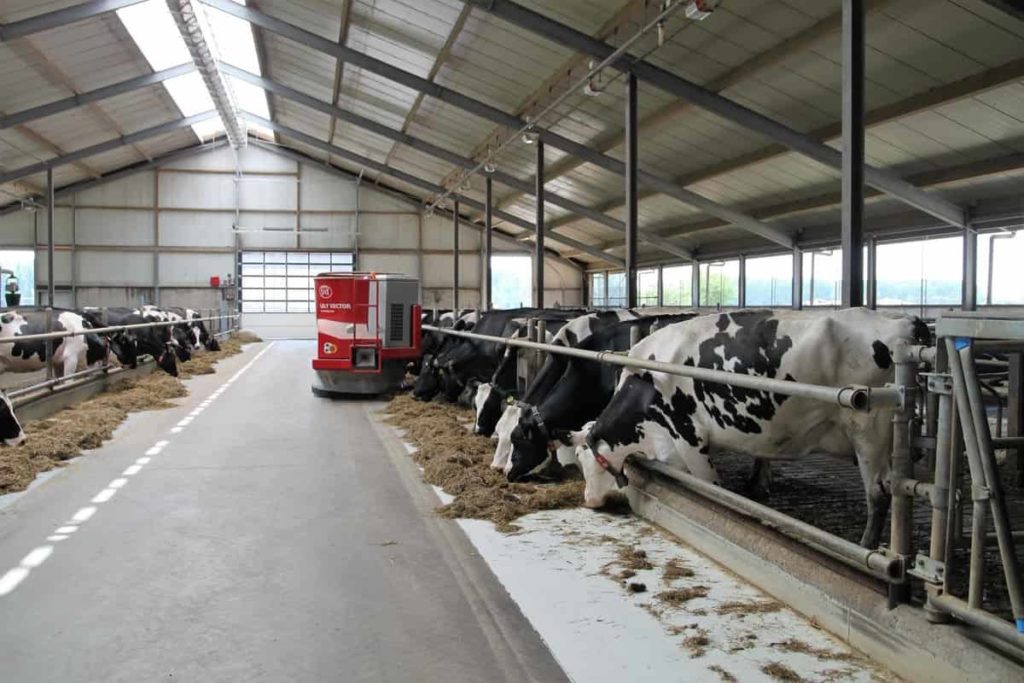
Market Composition
The United Arab Emirates does not depend much on imported dairy products. The local production of milk meets the majority of demand. Only approximately 24% of liquid milk, 13% yogurt, and 11% laban are imported. The products are imported not because of less production capacity. One of the key reasons for import is the demand for specific milk brands of foreign countries (which are majorly consumed by the people of those countries).
For example, there is a demand for Amul milk among the Indian people, Elle & Vire is a French company that exports milk to UAE, etc. The United Arab Emirates is the second largest producer of milk and dairy products in the ‘Gulf Corporation Council (GCC) region after Saudi Arabia.
Competitors
The foremost local milk producers and various milk products are NFPC (National Foods Product Company), Almarai, Al-Ain Dairy, Al-Rawabi Dairy, and Dubai Dairy Company. Together, they occupy the majority percentage (approximately 94%) of the total dairy products market in the UAE.
Identifying and Finalizing the Location of the Dairy Company
Any new entrepreneur who wishes to open a dairy plant in the UAE first must decide about the manufacturing unit’s location. The production center can either be located on the Mainland or in the Free Zone. Additionally, the decision about the city where the company will be established is equally essential because certain rules and regulations are emirate specific.
Legal Requirements and Certifications required for Opening a Dairy Farm in the United Arab Emirates
The United Arab Emirates has strict regulations for ensuring the smooth running of the business enterprise. All the entrepreneurs (whether the dairy company/or not a dairy company) must ensure that they comply with:
- All the rules and regulations that govern their respective business.
- All the laws which protect labor and consumer rights.
- All laws protect intellectual property rights.
- All laws relating to free zones in which the business is set up.
- All laws relating to health, safety, and environment.
In order to open a dairy plant in the country, it is essential to ensure that all the legal requirements and certifications related to the incorporation of the dairy company are understood.
Important certifications
For creating demand in a highly competitive and established market, the dairy products manufactured by the new company must comply fully with all the national and international quality standards, such as:
- Hazard Analysis Critical Control Point (HACCP)
- ISO 9001:2015; ISO 14001:2015; ISO 45001: 2018
- ISO 22000:2018 for Food Safety Management
- Halal Certificate for Camel Milk Powder
- EQM Certifications for flavored milk, flavored laban, pasteurized milk, etc
What is Emirates Quality Mark (EQM)?
In order to certify and ensure that the quality of milk and milk products being sold is of good quality, the “Emirates Authority for Standardisation and Metrology” (ESMA), has made “Emirates Quality Mark” (EQM) standards. EQM certification is an indicator that the dairy products comply with the UAE national standards, regional standards, and international standards, and they are manufactured and produced by a company that has an effective quality management system. The validity of EQM certification is three years.
The products which require EQM certification are:
- Flavoured Yoghurt
- Flavoured Milk
- Yogurturt
- Laban
- Flavoured Laban
- Pasteurized Camel Milk
- Goal Milk
- Laban Drink
In case you missed it: How this Farmer Made 1 Lakh Per Month from His Dairy Farm: A Success Story
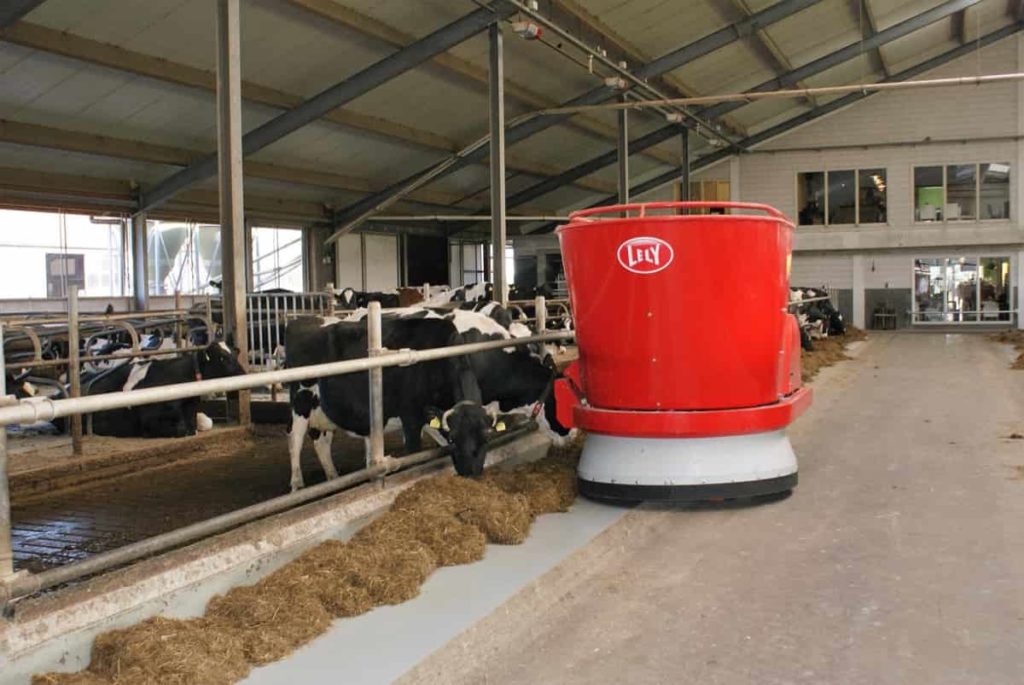
The products which do not require EQM certifications are:
- Dairy products consumed by infants and children
- Food items mentioned in the UAE standard number: 457 UAE.S/GSO
- Milk Products that restaurants prepare for recipes (For instance, Iranian milk)
- Dairy products are used as raw materials for processing food, and dairy products are imported for licensed industrial enterprises.
Legal requirements
- License: The entrepreneur who wishes to open a new company has first to decide whether the company will be located on the ‘Mainland’ or in the ‘Free Zone’ because there are some differences in the license requirements for both places:
- For the Commercial Companies located in the UAE mainland, a commercial license of 3 pages is required; the Professional Companies located in the UAE mainland should have a one-page trade license.
- All the companies established in the UAE free zone need to have a “Trade License” or a “Certificate of a license,” renewable either in 1 year or two years.
- Establishment Cards: Every company in the free zone or mainland must obtain an establishment card by registering with the General Directorate of Residency and Foreign Affairs. This card is required to obtain visa approvals for ex-pat staff.
- Labour Establishment Card: This card can be obtained from the Ministry of Labor, and the companies located only on the mainland are required to obtain it. This card enables the company to get workforce approval from the ministry.
- Trademark Registrations Certificate
- Testaments for the Protection of Assets: Foreign businessmen can obtain testaments/will drafted according to the country’s laws. This will protect the assets and the business in case of any dispute and ensure that the assets will not be treated as per Sharia Law.
- In case of incorporating a Limited Liability Company (LLC): This is the most popular method of opening a business in the UAE. The ‘Dubai Economic Development (DED) is the organization that issues all the licenses in case of setting up an LLC. There are many legal requirements for opening a company (whether dairy/not dairy) as a Limited Liability Company, such as: if the company is located on the mainland, then a UAE local partner national should hold at least 51% share in the company, minimum capital requirement for opening an LLC as per Dubai Licensing Authorities is AED 300,000, and there are many such other requirements.
The general documents that are required to be submitted by the entrepreneur who wishes to open an LLC are:
- Passport copies are certified for all the shareholders.
- UAE Residence visa (if applicable).
- No objection certificate (NOC) by a UAE resident who is a sponsor.
- Two certified address proofs for every shareholder.
- Sovereign Application form which has been signed.
- Reference Letter (Bank/Professional) for every shareholder
In case you missed it: Dairy Farming in Germany: Breeds, and How to Start
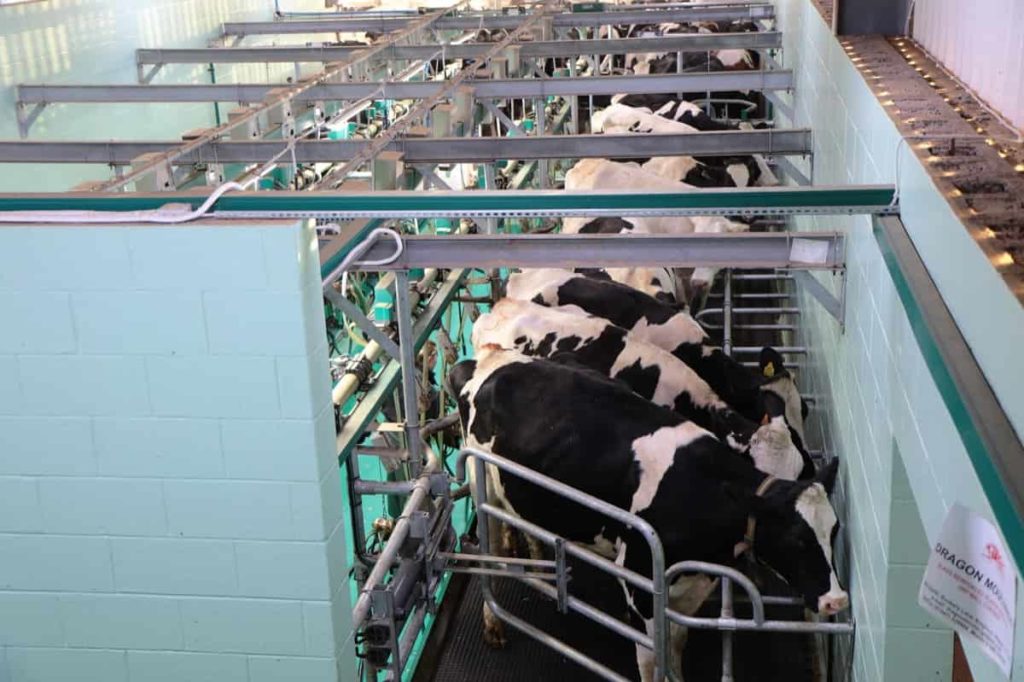
The entrepreneur’s home country and the relevant UAE consulate should attest all the required documents. Additionally, all the documents need to be translated into the Arabic language by an official translator
Funds required
The bare minimum fund required to open a Limited Liability Company on the mainland is AED 13,270. This cost only includes the charges for fulfilling some important legal requirements. The dairy company will require additional funds depending on the number of dairy products it plans to manufacture, the machinery it plans to use, the type of dairy animals, etc. Similarly, the minimum cost to set up a Limited Liability Company in Free Zone is AED 17,900 (cost only includes the charges for fulfilling some important legal requirements).
Understand the Difficulties and Take Relevant Steps to Address the Situation
Intense Heat because of the Geographical Location
- Challenge: The harsh climate and intense heat do not provide a natural environment for dairy farming. The cattle are not used to such strong heat and they require special protection. In the summer, the temperature crosses 50 degrees, and the dairy animals must tolerate the high temperatures. Warm and humid climatic conditions affect dairy animals, reducing the quantity and quality of milk produced and harming their health.
- Methods adopted to address the challenge: The companies take the following measures to address the challenge: (i) Dairy plants use thick curtains to block the sun’s rays and protect the animals from sunlight, (ii) use air-cooled industrial water chillers, (iii) coolers & wall mounted fans, etc. to maintain the temperature below 25 degrees. Additionally, to decrease the negative impact of heat on dairy animals, manufacturing companies use ear tags that monitor the health and activity of each cow.
Low availability of fodder and water
- Challenge: The desert environment does not support dairy farming because of the absence of natural grazing grasslands.
- Methods adopted to address the challenge: Animal food is imported from other countries such as the United States of America, South Africa, Brazil, Argentina, etc. The dairy companies ensure that the required nutrition in the food is maintained so that the dairy animals are healthy and do not require added medicines. In addition, many dairy farms use water treatment plants with ozone and ultra-violet ray filtration systems to meet the water requirements.
Knowledge about the latest technology and equipment required
In the United Arab Emirates, the latest technology and equipment are used to manufacture milk and milk products. Equipment and machines are required for further processing of milk (like pasteurization, standardization, fermentation, and homogenization) to maintain the quality and nutrition of milk. Any new entrepreneur who wishes to open a dairy company must identify and arrange for the machines and equipment required in the production process of dairy products.
In case you missed it: Dairy Farming in Switzerland: Breeds, How to Start
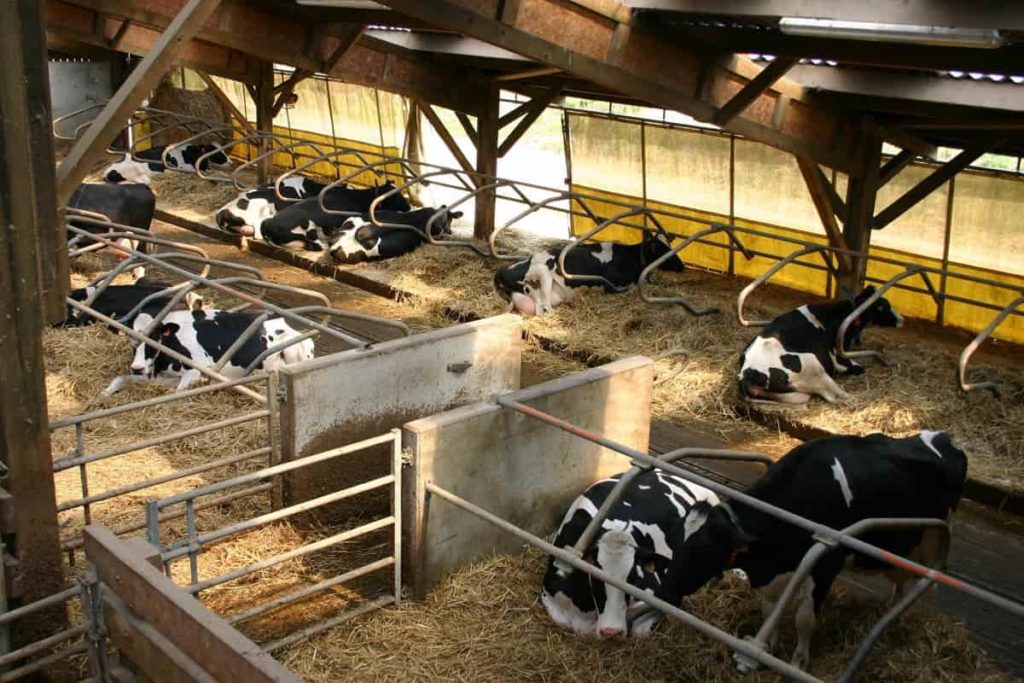
Dairy Animals
There is a list of approved countries for importing livestock. This list is issued by the United Arab Emirates Ministry of Climate Change and Environment. Not all animals can be imported from any country. For instance:
- No livestock can be imported from the Bahamas
- Only Sheep, Goats & Cows can be imported from Belgium and Brazil, but Camels cannot be imported from these countries
- Sheep & Goats, Camels, and Cows can be imported from Bahrain.
Similarly, there are restrictions on the type of dairy animals imported from different countries.
Conclusion
Dairy Farming Industry in the United Arab Emirates is booming because of the ever-increasing population, tourist influx, health-conscious population, and fast economic growth. The demand for milk and milk products is majorly met by local dairy companies, because of which the import of dairy products is very less. Therefore, it is very important to study the market and meet all the legal requirements to open a dairy company.
Some of these laws are emirate specific (for instance, certain laws will apply only to Dubai and not to any other emirate). The dairy industry only has large players in the market because there are a lot of challenges in the dairy industry (such as high temperatures and low availability of fodder and water for dairy animals) and large companies can only afford the large funds required to meet the challenges.
- Economical Aquaculture: A Guide to Low-Budget Fish Farming
- 15 Common Planting Errors That Can Doom Your Fruit Trees
- How to Make Houseplants Bushy: Effective Tips and Ideas
- Innovative Strategies for Boosting Coconut Pollination and Yield
- Pollination Strategies for Maximum Pumpkin Yield
- The Complete Guide to Chicken Fattening: Strategies for Maximum Growth
- Natural Solutions for Tulip Problems: 100% Effective Remedies for Leaf and Bulb-Related Issues
- Revolutionizing Citrus Preservation: Towards a Healthier, Greener Future
- Natural Solutions for Peony Leaf and Flower Problems: 100% Effective Remedies
- Maximizing Profits with Avocado Contract Farming in India: A Comprehensive Guide
- Natural Solutions for Hydrangea Problems: 100% Effective Remedies for Leaf and Flowers
- The Ultimate Guide to Choosing the Perfect Foliage Friend: Bringing Life Indoors
- From Sunlight to Sustainability: 15 Ways to Use Solar Technology in Agriculture
- The Ultimate Guide to Dong Tao Chicken: Exploring from History to Raising
- The Eco-Friendly Makeover: How to Convert Your Unused Swimming Pool into a Fish Pond
- Mastering the Art of Delaware Chicken Farming: Essentials for Healthy Backyard Flocks
- 20 Best Homemade Fertilizers for Money Plant: DIY Recipes and Application Methods
- How to Craft a Comprehensive Free-Range Chicken Farming Business Plan
- Brighten Your Flock: Raising Easter Egger Chickens for Beauty and Bounty
- How to Optimize Your Poultry Egg Farm Business Plan with These Strategies
- Subsidy for Spirulina Cultivation: How Indian Government Schemes Encouraging Spirulina Farmers
- Ultimate Guide to Raising Dominique Chickens: Breeding, Feeding, Egg-Production, and Care
- Mastering the Art of Raising Jersey Giant Chickens: Care, Feeding, and More
- Ultimate Guide to Raising Legbar Chickens: Breeding, Farming Practices, Diet, Egg-Production
- How to Raise Welsummer Chickens: A Comprehensive Guide for Beginners
- How to Protect Indoor Plants in Winter: A Comprehensive Guide
- Ultimate Guide to Grow Bag Gardening: Tips, Tricks, and Planting Ideas for Urban Gardeners
- Guide to Lotus Cultivation: How to Propagate, Plant, Grow, Care, Cost, and Profit
- Agriculture Drone Subsidy Scheme: Government Kisan Subsidy, License, and How to Apply Online
- Ultimate Guide to Raising Araucana Chickens: Breed Profile, Farming Economics, Diet, and Care
- Bringing Hydroponics to Classroom: Importance, Benefits of Learning for School Students
- Ultimate Guide to Raising Polish Chickens: Breed Profile, Farming Economics, Diet, and Care
- Ultimate Guide to Raising Australorp Chickens: Profile, Farming Economics, Egg Production, Diet, and Care
- Silkie Chicken Farming: Raising Practices, Varieties, Egg Production, Diet, and Care
- Sussex Chicken Farming: Raising Practices, Varieties, Egg Production, Diet and Care
- Homemade Feed Formulations for Livestock: Discover Cost-effective Starter to Finisher Feed Recipes
How can I get your materials